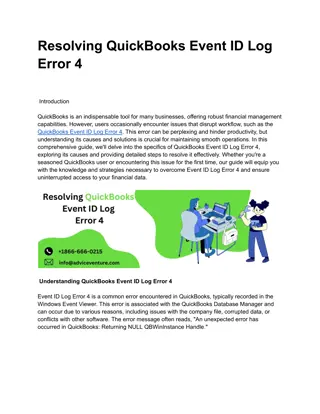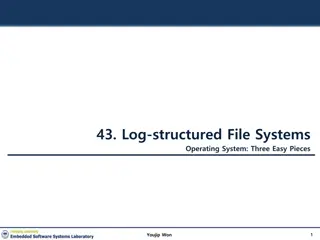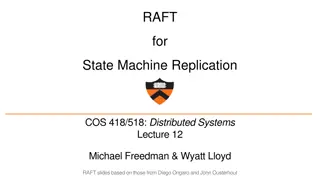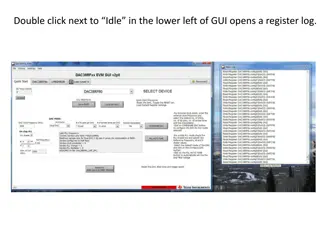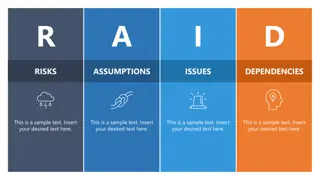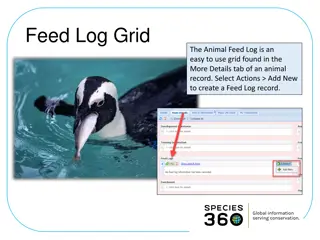
Log Management in Computer Science: Key Points and Features
Log management plays a crucial role in the field of Computer Science by facilitating tasks such as debugging, monitoring, and auditing. This comprehensive guide explores the importance of log management in gathering, processing, and storing logs generated by various systems and applications. It emphasizes the need for log collection, aggregation, storage, and retention, showcasing tools like ELK/EFK, Splunk, Datadog, and more. The key points highlighted include the accessibility of visual dashboards, real-time monitoring, and the significance of data analytics in predicting system accidents.
Download Presentation

Please find below an Image/Link to download the presentation.
The content on the website is provided AS IS for your information and personal use only. It may not be sold, licensed, or shared on other websites without obtaining consent from the author. If you encounter any issues during the download, it is possible that the publisher has removed the file from their server.
You are allowed to download the files provided on this website for personal or commercial use, subject to the condition that they are used lawfully. All files are the property of their respective owners.
The content on the website is provided AS IS for your information and personal use only. It may not be sold, licensed, or shared on other websites without obtaining consent from the author.
E N D
Presentation Transcript
Log Management wangth Computer Center of Department of Computer Science, NYCU 1
Log Management A system for gathering, processing and storing large volumes of logs, which were generated by operating systems, network appliance (switches, routers), or software applications. Provides an interface for human reading, and may have APIs for program processing 2
Why Log Management (1) For Debug Some bugs occurs only in particular situation, not always happen Replay the actions to reproduce the bug Test new features without affecting customers For Audit Who did the management? Who did rm rf ? 3
Why Log Management (2) For Monitoring Statistics from logs (e.g. HTTP 500s) Abnormal numbers (increasement or decrement) means some parts of systems going wrong For AIOps Help administrators to predict accidents by machine learning models Data is the key part of AI 4
Log Management Key Points Accessible Visual Dashboard Raw logs for deep debugging Durable Can not be deleted / modified by anyone Keep for reasonable time Financial records: 7 years Realtime / near real-time Find accidents ASAP Alert administrators if there is bad smell from statistics 5
Log Management Features Log collection Centralized log aggregation Long-term log storage and retention Log rotation Log analytics Log search and reporting 6
Log Management Software ELK / EFK Elasticsearch + Logstash (Fluentd) + Kibana Sentry (Application Monitoring) Splunk (Data Platform) Datadog (SaaS, Cloud Monitoring as a Service) Google Cloud Logging (Stackdriver) AWS CloudWatch 7
ELK / EFK Elasticsearch + Logstash (Fluentd) + Kibana Elasticsearch Storage and Index service for logs Logstash / Fluentd Log collection, preprocessing, and aggregation Kibana Visual dashboard for log analytics Logstash Elasticsearch Kibana Fluentd 8
Elasticsearch An open-source, full-text search engine based on Apache Lucene Features Distributed Multitenancy Serving multiple types of documents in one Elasticsearch cluster Near real-time search Developed and maintained by Elastic NV The open-source business model 9
Elasticsearch Basic Concept (1) Document The base unit of storage of Elasticsearch Row in RDBMS JSON format Unique ID (UID) Index The logical partition of documents Table in RDBMS Store similar documents We can have multiple indices in one Elasticsearch cluster 10
Elasticsearch Basic Concept (2) Nodes The service instance running Elasticsearch Types Master node Maintain cluster state Distribute shards to data nodes Create and delete indices Data node Hot & warm node Cold node Ingest node Pre-processing pipelines 11
Elasticsearch Basic Concept (3) Shards Store index and documents A single Lucene index Indices will be split to serval shards Shards will be duplicated for high availability 12
Logstash Collect, parse and transform logs An open-source software developed by Elastic NV Support plugins for input, filtering and output https://www.elastic.co/guide/en/logstash/current/input-plugins.html https://www.elastic.co/guide/en/logstash/current/output- plugins.html https://www.elastic.co/guide/en/logstash/current/filter-plugins.html Input Web access logs / Syslogd / APIs / Output Elasticsearch/ IM (Slack / Discord) / Syslogd / 13
Logstash Configuration logstash.conf 14
Fluentd: Unified Logging Layer An open-source project for unifying the data collection and consumption Original developed by Treasure Data, now it is under the Cloud Native Computing Foundation (CNCF) https://www.fluentd.org Support plugins for data source, outputs and processing 15
Unified Logging Layer A layer for filtering, buffering and routing data Provides a unifying format (JSON) for data processing and transport Data buffering and retry-able data-transfer Horizontally scalable Reduce Complexity 16
Beats A lightweight data collector, developed by Elastic NV Send collected data to Logstash or Elasticsearch Centralized configuration in Kibana Types Auditbeat: Audit data Filebeat: Log files Functionbeat: Cloud data Heartbeat: Availability Metricbeat: Metrics Packetbeat: Network traffic Winlogbeat: Windows event logs 18
Kibana Visual dashboard for users querying logs stored in Elasticsearch An open-source project developed by Elastic NV 19
Reference https://www.elastic.co/guide/en/elasticsearch/reference/current/getti ng-started.html https://www.elastic.co/guide/en/logstash/current/index.html https://docs.fluentd.org/ 21


